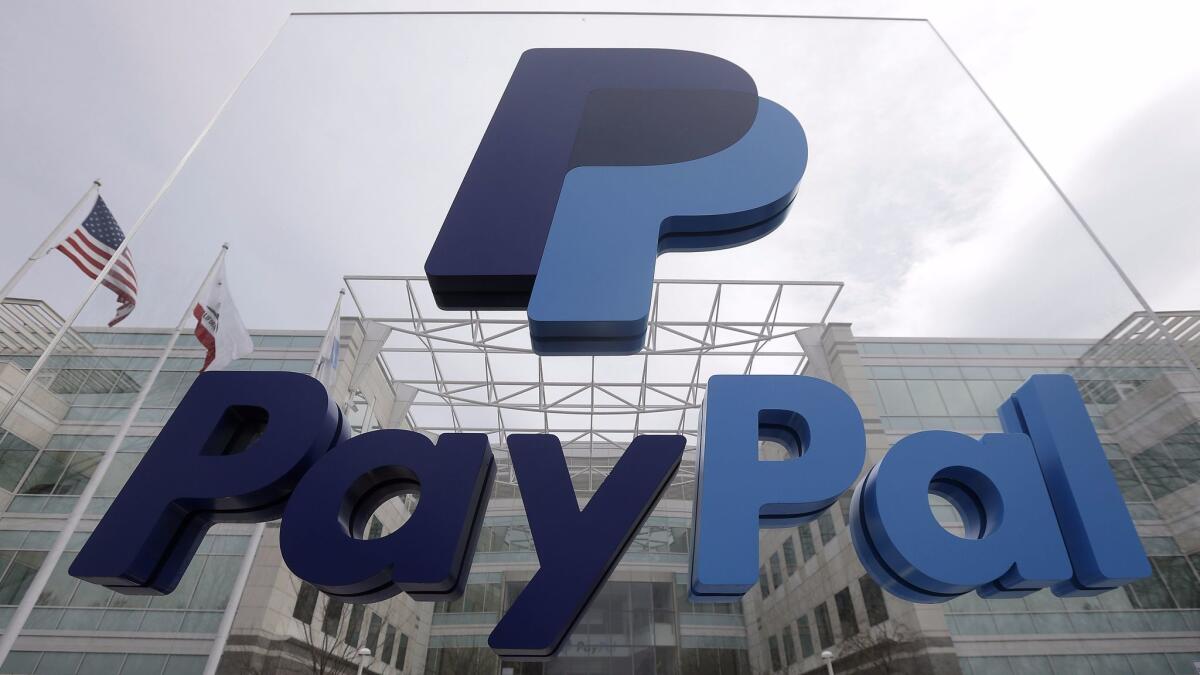PayPal just struck L.A.’s biggest ever tech deal

- Share via
Digital payments giant PayPal Holdings Inc. announced a deal to buy the downtown Los Angeles-based Honey Science Corp. for $4 billion Wednesday, marking the largest acquisition of a tech company in L.A. history.
The purchase of the start-up, which makes a popular browser extension that enables users to compare prices while shopping online, eclipses Amazon.com Inc.’s acquisition of video doorbell company Ring in 2018 for $1.8 billion and Facebook’s $2-billion purchase of virtual reality headset company Oculus VR in 2014.
Honey enables its 17 million users to compare prices over time, make shopping lists and participate in rewards programs with partner retailers such as Walmart, Amazon, Macy’s and EBay, PayPal’s original parent company. With this acquisition, PayPal plans to add Honey’s technology to its PayPal and Venmo products, allowing it to extend its interactions with consumers beyond the checkout screen.
“We are looking to become a part of our consumers’ lives,” PayPal Chief Executive Dan Schulman said on a call with reporters and analysts. “I believe this will be a transformative acquisition for PayPal. It significantly accelerates our capabilities and widens our market relevance.”
Schulman cited research finding 40% of e-commerce sales happen after a particular trigger event, such as the price-drop alerts Honey sends to users. Japanese e-commerce giant Rakuten offered a similar rationale for its recent $1-billion purchase of deals site Ebates.
Honey was profitable in 2018, PayPal said in a statement. The 7-year-old start-up will keep its headquarters in Los Angeles, where it has been since its founding in 2012, and the founders will continue to run the business.
William Hsu, co-founder and partner of Santa Monica venture capital fund Mucker Capital, the first investor in the start-up, recalled that he passed on the company when co-founder Ryan Hudson first came calling.
“The first time Ryan pitched us, we actually were too stupid to invest,” Hsu said. “They actually couldn’t raise money from anyone in L.A. for a couple years, so he took a job and kept running Honey on the side.”
The next time Hudson and co-founder George Ruan got in touch, the company had hundreds of thousands of consumers using its browser plug-in, and Hsu was convinced.
Initially, Honey had no money coming in. The tipping point came when it crossed the 1.5-million user threshold. “That’s when the commerce companies started proactively reaching out,” Hsu said, and Honey started cutting deals for a commission on sales it drove.
By 2018, the start-up had annual revenues of $100 million, with a 100% growth rate, according to figures cited on the conference call. With public markets showing signs of souring on tech start-ups powering their growth through large annual losses, in the wake of Uber’s disappointing initial public offering and WeWork’s aborted one, Honey’s combination of momentum and profitability helps explain PayPal’s willingness to pay a multiple of 40 times 2018 revenues.
“It’s not one of these start-ups that burns a billion dollars a year,” Hsu said. Even so, he said, “certainly, this valuation was higher than we expected.”
Honey is PayPal’s first major acquisition this year, after a string of deals last year that included Hyperwallet, IZettle and Simility. PayPal has more than $10 billion in cash, and executives recently signaled the company’s openness to acquisitions.
“You can expect us to be acquisitive going forward,” Schulman said on a conference call with analysts this summer. PayPal looks at hundreds of potential deals every quarter, he said, describing acquisitions as “a part of who we are on an ongoing basis.”
PayPal shares fell as much as 2.3% in extended trading after the news.
Bloomberg contributed to this report.







